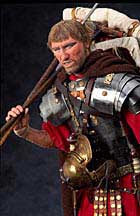Email: hflower@princeton.edu
Background:
B.A. University College, Oxford ’83, Ph.D. Penn ’93.
Professor Flower is teaching and writing about Roman social and cultural history, with a special emphasis on material culture. Her previous research has focussed on various facets of the study of memory and of spectacle in Roman culture, notably during the Republic. She has published Ancestor Masks and Aristocratic Power in Roman Culture and The Art of Forgetting: Disgrace and Oblivion in Roman Political Culture as well as many articles. She is the editor of Cambridge Companion to the Roman Republic. Her current research is a book on the city of Rome during the Republic.
Books:
The Art of Forgetting: Disgrace and Oblivion in Roman Political Culture, (University of North
Carolina Press, Chapel Hill, Studies in the History of Greece and Rome, eds. P. J. Rhodes, R.
Osborne, and R. J. A. Talbert). 2006.
The Cambridge Companion to the Roman Republic, (ed). H. I. Flower (Cambridge, 2004).
Ancestor Masks and Aristocratic Power in Roman Culture, (Oxford, Clarendon Press, 1996,
paperback edition 1999).
Roman Women: Selected Readings, (Providence, Rhode Island, 1986), a Latin reader published
through a grant from the Rhode Island Committee for the Humanities.
Recent Articles:
"Spectacle and Political Culture in the Republic," in H. I. Flower (ed.), The Cambridge
Companion to the Roman Republic (Cambridge, 2004) 322-43.
Book Review: BMCR 2003.12.20: Egon Flaig, Ritualisierte Politik. Zeichen, Gesten und
Herrschaft im Alten Rom. Historische Semantik Band 1 (Göttingen, 2003).
"Memories of Marcellus: History and Memory in Roman Republican Culture," in Formen
römischer Geschichtsschreibung von den Anfängen bis Livius: Gattungen – Autoren - Kontexte,
edited by U. Eigler, U. Gotter, N. Luraghi, U. Walter (Darmstadt 2003), 1-17.
"Were Women ever 'Ancestors' in Republican Rome?" in Images of Ancestors, ed. J. Munk Højte,
Aarhus Studies in Mediterranean Antiquity 5, University of Aarhus Press, (Aarhus, Denmark,
2002), 157-82.
"Roman Historical Drama and Nero on Stage," a commentary on P. Kragelund, "Historical
Drama in Ancient Rome: Republican Flourishing and Imperial Decline?" Symbolae Osloenses 77
(2002), 68-72.
"Rereading the Senatus Consultum de Bacchanalibus of 186 BC: Gender Roles in the Roman
Middle Republic," in Oikistes: Essays in Honor of A. J. Graham, edited by Vanessa B. Gorman
and Eric W. Robinson, (Leiden, 2002), 79-98.
Review of C. W. Hedrick Jr., History and Silence. Purge and Rehabilitation of Memory in Late
Antiquity (Austin, TX, 2000), Classical Journal 97 no. 2 (December 2001-January 2002), 207-
209.
"A Tale of Two Monuments: Domitian, Trajan, and some Praetorians at Puteoli (AE 1973, 137),"
American Journal of Archaeology 105.4 (2001), 625-48.
"Fabula de Bacchanalibus: the Bacchanalian Cult of the Second Century BC and Roman
Drama," in G. Manuwald (ed.), Identität und Alterität in der frührömischen Tragödie (Identitäten
und Alteritäten, vol. 3, Altertumswissenschaftliche Reihe vol. 1, Würzburg, 2000), 23-35.
"Damnatio Memoriae and Epigraphy," in E. R. Varner, (ed.) From Caligula to Constantine:
Tyranny and Transformation in Roman Portraiture (Atlanta, 2000) 58-69, the catalogue of an
exhibition at the Michael C. Carlos Museum, Emory University, (Fall 2000), and at the Yale
University Art Gallery (Spring 2001).
"The Tradition of the Spolia Opima: Marcus Claudius Marcellus and Augustus," Classical
Antiquity 19.1 (2000), 34-64.
Technorati Tags: Harriet Flower, Princeton, classics, professor, Roman, Rome, Roman Republic,

 Professor Baraz specializes in Latin literature and Roman culture. She is interested in how literary texts shape, and are in turn shaped by, social and cultural forces. She is currently completing a book manuscript entitled Cicero's Philosophical Politics that locates the body of philosophical work Cicero produced in the 40s BCE under Caesar's dictatorship in its historical and cultural context. She is also working on a new project that explores the meaning of pride and related concepts in Roman society (a paper on this subject is forthcoming in "Kakos": Badness in Classical Antiquity, Ralph Rosen and Ineke Sluiter, edd., Brill 2008).
Professor Baraz specializes in Latin literature and Roman culture. She is interested in how literary texts shape, and are in turn shaped by, social and cultural forces. She is currently completing a book manuscript entitled Cicero's Philosophical Politics that locates the body of philosophical work Cicero produced in the 40s BCE under Caesar's dictatorship in its historical and cultural context. She is also working on a new project that explores the meaning of pride and related concepts in Roman society (a paper on this subject is forthcoming in "Kakos": Badness in Classical Antiquity, Ralph Rosen and Ineke Sluiter, edd., Brill 2008).








